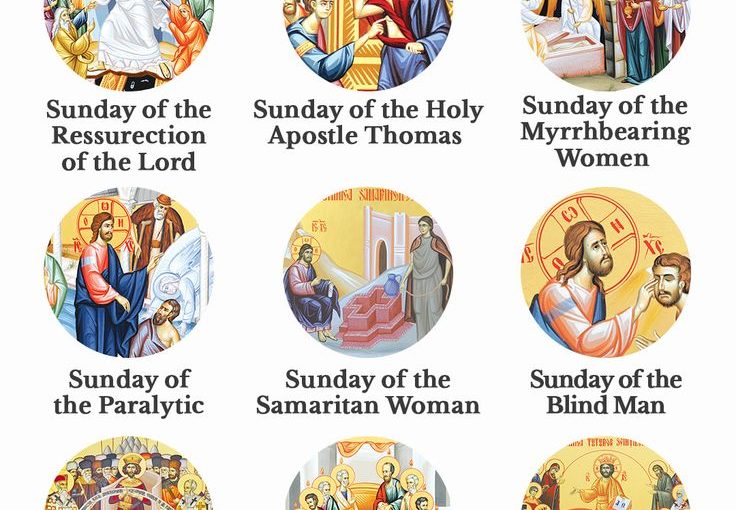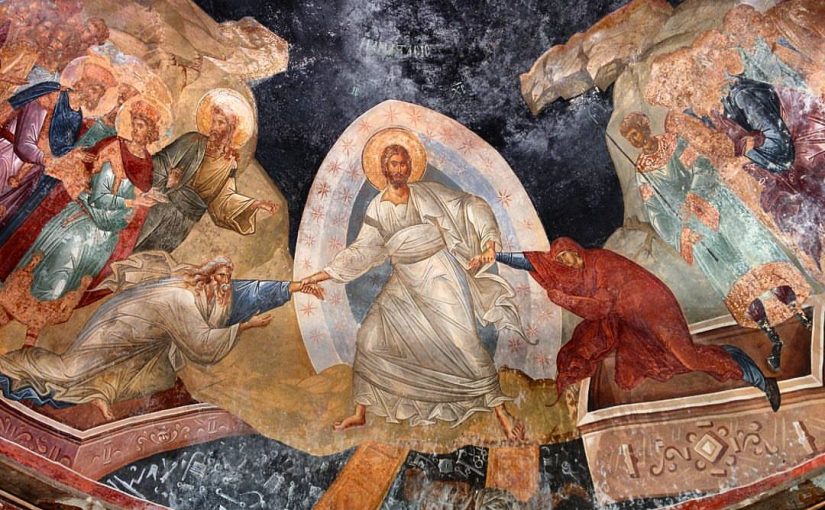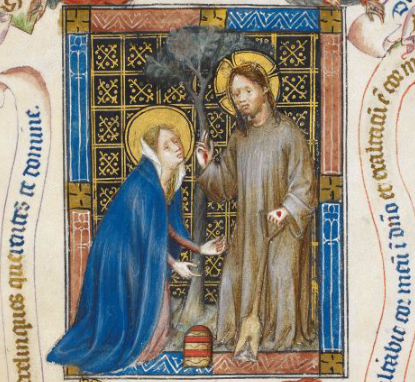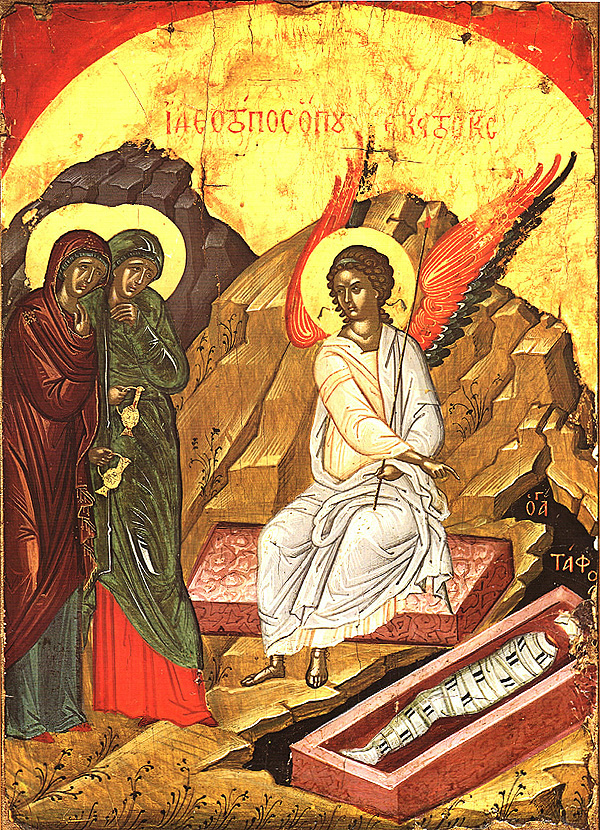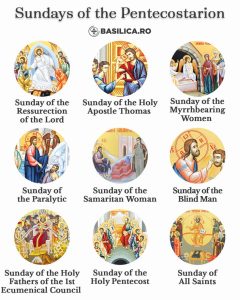 The Pentecostarion lasts 8 weeks from Sunday of the Resurrection of the Lord to the First Sunday after the Pentecost or Sunday of All Saints.
The Pentecostarion lasts 8 weeks from Sunday of the Resurrection of the Lord to the First Sunday after the Pentecost or Sunday of All Saints.
Tag: Easter
Sunday of the Paralytic Man 2024
In speaking about the liturgical contours of today’s commemoration, Fr David Petras uses St. John Chrysostom to draw our attention deeper into the mystery we are presented in the Gosepl. Chrysostom “tells us that if an unbeliever enters a church during a baptism, all he sees is people being washed. But a believer sees people being reborn in the Spirit. The unbeliever sees only with the eyes of the body, the believer sees with the inner eyes of the soul. When we are baptized all our body sees and feels is water, but by the Spirit our sins are washed away and we become children of God.”
Why Chrysostom identifies for us applies to all of the spiritual life and the sacraments of the Church. For example, when we receive Holy Communion, if we only see and taste with the eyes and mouth bread and wine but not with the eyes of the Holy Spirit we will miss on the fact of the Lord’s love, forgiveness of sins and and healing and the deepest reality of salvation. The Mystery of the bread of life is more than a social pact or a sense of social respectability. Receiving the Eucharistic Lord is communion with the God and with one another as it is the divine pledge of eternal life: new life.
The Sunday of the Paralytic Man teaches us that the water of Bethesda is meaningless if we neglect the fact the word given by Jesus is full of power and energy to transform thus identifying the presence of God. Jesus speaks the word and gives the man the strength to walk.
The water of the Bethseda pool is a type of Baptism. The waters of Baptism not only wash and make us adopted children of God. The waters of Baptism heals us spiritually and physically. One aspect of today’s Gospel is that illness is “a lesser manifestation of death. Here Jesus’s word exercises power over the man’s illness pointing our attention once again to his own power over death.
What do we learn on this 3rd Sunday after Pascha? What is the take-away lesson? First, we don’t make ourselves. Everything we have and are is given and sustained by God. Second, our identity as Christians is based not on a theory or a vague theological idea but on the person of Jesus the Christ. Third, we learn that by ourselves we cannot forgive, heal or love or be saved. Human nature can’t forgive without the prompting of the Holy Spirit.
On Wednesday, April 24, we are mid-way to Pentecost. The Gospels we read at the Divine Liturgy bring our focus of faith into greater clarity as we approach the solemn feast of Pentecost.
Christ is risen!
Easter of the Resurrection –Cardinal Filoni’s message 2023
This is the recurring expression we read in the calendar on the Sunday on which the Church celebrates Jesus, the Risen One. It is an expression we also find in liturgies and theology; in short, it is the language of the Church. But what does ‘Easter of the Resurrection’ mean? Certainly many grasp its meaning perhaps through catechetical reminiscence, but it is also worth seeking its deeper meaning.
In the Catholic liturgy, the two terms – Easter and Resurrection – go hand in hand and refer to two extraordinary events that should be briefly recalled. First of all, Easter finds its origins in the Greek word for ‘Passover’, originally from the Aramaic pashd’ (in Hebrew pesach), is used in the Bible (Ex 12:48) to recall the ‘passing of God’ and the ‘exodus’ of the Jews from Egypt; it is a feast of great importance, full of familial and sacred rites. Jesus and his natural family devoutly celebrated it every year as was and is traditional in observant Jewish families. The celebration became a memory, a story, a prayer of gratitude and praise to the Eternal for the intervention in favor of ‘His’ people. It is not an epic, because Passover concretely touches the life of every good Jew, so much so that it binds him to God in an eternal Covenant, and vice versa; but also to the land he will bequeath to his children; Passover is a celebration around the Word of God; it is a perennial journey.
Jesus assumes, but then also transcends, the meaning of that Jewish solemnity; so much so that not only did he not want to ignore it despite being ‘sought after’ by the Sanhedrin, but, he “earnestly desired” (Desiderio desidervi – Lk 22:15) to celebrate it together with the Twelve, his new family, in deference to the style of the so-called chaburot (the gatherings for pilgrims who went to Jerusalem for the occasion); during that Last Supper, Jesus introduces something unexpected with respect to the practice: he gives thanks to the Eternal and offers his ‘Body’ and ‘Blood’ to the Twelve in the concrete matter of bread and wine, as a sign of the new Covenant.
Jesus’ “Gesture” is an important novelty and will allow the Apostolic Community, not only to be formed around the Risen One and to be consecrated for the coming of the Holy Spirit, but also to be constituted, as Ekklesìa, that is, Community of the faithful, and to repeat it; that “Gesture” is also God’s “Gift” for us and this in the friendship of Jesus Christ, of the One who forgives and allows humanity to accept it as an expression of God’s own love and to return it to God; in short: love and sacrifice come together. Benedict XVI wrote all the currents from the Old Covenant are also present that in every celebration of the Eucharist, and in some way also the secret expectation of all religions (Themes of Dogmatic Theology in Che cos’è il cristianesimo).
When we say ‘Resurrection’, the reference is to the body of Christ in which human life was no longer there. Jesus is laid in a tomb. It was approaching the beginning of Shabbat, the Sabbath on which no actions involving work could be performed, corresponding to that seventh day on which, after creation, God ‘rested’. Jesus observes it in the silence of death; it is the day of Sabbath rest, apparently an “idle” time.
For the Catholic liturgy, ‘Holy Saturday’ has become the day of meditation, of intimate sorrow, the day when we recall all of the memories, the words, the many whys that accompany extreme moments, such as death. This until the first day of the week after the Sabbath, which for Christians is Sunday and for Holy Scripture corresponds to the day of the creation of light (cf. Gen 1:5). An analogy that is not accidental!
On that day, the first of the week, the unexpected, the unprecedented, the most shocking event took place: The Resurrection of Christ.
“Whom do you seek?” This was the question put to those, women and men, who had gone to visit a deceased person. The only ones present at the moment of the Resurrection had been the soldiers, but then they had fled in shock, to report back to those who had ordered them to custody the tomb.
Now the Risen Christ becomes the space for the adoration of God, comments Benedict XVI; Christian faith is born and our inclusion in the new ‘Body’ is realized, which definitively unites every baptized person to the Risen One. This is the Easter of Resurrection. In the Christian faith, Jesus’ death is the most radical act of love in which the reconciliation between God and a world marked by sin is truly accomplished, and the Resurrection is the most sublime event of God’s work.
Every Knight and Dame must embrace within themselves this mystery that qualifies them in a special way for a very high spiritual mission. The event of the Resurrection reminds us that Christ transcends in Himself human nature and history, and in the newness of His being the Living One, our conversion to the Lord holds incomparable glory (cf. Heb 3:10, 16).
It is in the Easter Resurrection that the Risen One offers us, the Order of the Holy Sepulchre in Jerusalem, who have visited him on our pilgrimages like the pious women and disciples, an “inheritance” with the “Title” of the place of his deposition, and to enter into his friendship and be destined for a mission of faith and high charity. That Sepulchre in which the Son of God had laid the burden of our sinful and sorrowful humanity, becomes the place of the beginning of new life in Him, of hope for all the multitudes.
As the Son of God, says the Letter to the Hebrews, “Christ (… ) as a Son over His house—whose house we are, if we hold fast our confidence and the boast of our hope firm until the end” (Heb 3:6).
Happy Easter of the Resurrection!
Fernando Cardinal Filoni
April 2023
Mary’s love and longing
A most holy and blessed Easter to all!
“While it was still dark Mary Magdalene had come to watch at the tomb, and she found Jesus whom she sought standing there in the flesh. But you must know him now according to the spirit, not according to the flesh, and you can be sure of finding his spiritual presence if you seek him with a desire like hers, and if he observes your persevering prayer. Say then to the Lord Jesus, with Mary’s love and longing: ‘My soul yearns for you in the night; my spirit within me earnestly seeks for you.'”
From an Easter sermon by Guerric of Igny
Easter Sunday answers our questions
Sing Alleluia, Christian
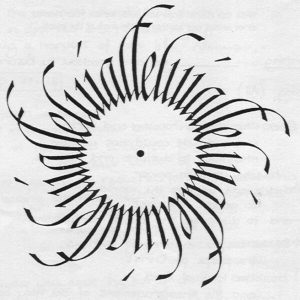 After all our trials have ceased, our life will be taken up entirely with God’s praises. Therefore, it is our custom to commemorate this peaceful and blissful state by chanting Alleluia more frequently and joyfully during these fifty days.
After all our trials have ceased, our life will be taken up entirely with God’s praises. Therefore, it is our custom to commemorate this peaceful and blissful state by chanting Alleluia more frequently and joyfully during these fifty days.
In the book of Revelation, John the Evangelist says that he heard the throngs of heavenly powers singing this word. And the venerable father, Tobit, perceiving something of the glory of the citizens on high and the splendor of the heavenly Jerusalem, described it with these mystical words:
All the streets shall be paved with white and clean stones,and, Alleluia shall be sung in its streets. (Tobit 13:22)
St. Bede the Venerable
Quoted in: Your Hearts Will Rejoice
Ludolph of Saxony, Carthusian
Bear the mark of Jesus
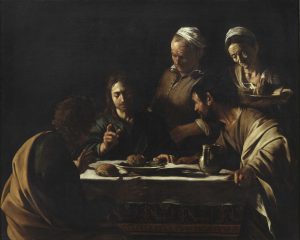 In the Gospel it is revealed that Jesus breaks bread on the road to Emmaus. This 12th century monastic author teaches:
In the Gospel it is revealed that Jesus breaks bread on the road to Emmaus. This 12th century monastic author teaches:
“Break yourself, then, by the labor of obedience, by the humiliation of repentance. Bear in your body the marks of Jesus Christ by accepting the condition of a servant, not of a superior. And when you have emptied yourself, you will know the Lord through the breaking of bread.”
Blessed Easter
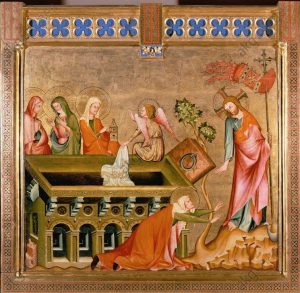 Dear friends in Christ: today, right now, we realize that our lives are filled with Divine meaning. Our personal stories are a part of a much bigger narrative. Your life, my life — our lives are all a part of the story of the family of God and the history of salvation. Jesus Christ is the point of unity and completeness in God.
Dear friends in Christ: today, right now, we realize that our lives are filled with Divine meaning. Our personal stories are a part of a much bigger narrative. Your life, my life — our lives are all a part of the story of the family of God and the history of salvation. Jesus Christ is the point of unity and completeness in God.
In the First Ode of the Canon of Pascha, we read (sing):
It is the day of Resurrection! O people, let us be enlightened by it.
The Passover is the Lord’s Passover,
snce Chrits our God has brought us from death to life,
and from earth to heaven,
Therefore we sing the hymn of victory!
CHRIST IS RISEN FRM THE DEAD!
Let us cleanse our sense that we may see the risen Christ,
in the glory of the Resurrection and clearly hear Him greetinbg us:
Rejoice! as we sing the hymn of victory!
CHRIST IS RISEN FROM THE DEAD!
Let the heaves properly rejoice and let the earth be glad;
and let the whole visible and invisble world celebrate,
for Christ, our everlastng joy, is rosen!
CHRIST IS RISEN FROM THE DEAD!
It is the day of Resurrection! O people, let us be enlightened by it.
The Passover is the Lord’s Passover,
snce Chrits our God has brought us from death to life,
and from earth to heaven,
Therefore we sing the hymn of victory!
Happy Easter!
Lent over?
Regina Caeli for Eastertide
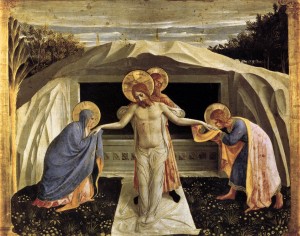 We change the praying of the daily praying of the Angelus to the Regina Caeli for the 50 days of Easter. (That is, from Easter Day through Pentecost Sunday). Please add this prayer, in Latin and English, to your iPhone.
We change the praying of the daily praying of the Angelus to the Regina Caeli for the 50 days of Easter. (That is, from Easter Day through Pentecost Sunday). Please add this prayer, in Latin and English, to your iPhone.
Queen of Heaven
V. Queen of Heaven, rejoice, alleluia.
R. For He whom you did merit to bear, alleluia.
V. Has risen, as he said, alleluia.
R. Pray for us to God, alleluia.
V. Rejoice and be glad, O Virgin Mary, alleluia.
R. For the Lord has truly risen, alleluia.
Let us pray. O God, who gave joy to the world through the resurrection of Thy Son, our Lord Jesus Christ, grant we beseech Thee, that through the intercession of the Virgin Mary, His Mother, we may obtain the joys of everlasting life. Through the same Christ our Lord. Amen.
Regina caeli
V. Regina caeli, laetare, alleluia.
R. Quia quem meruisti portare, alleluia.
V. Resurrexit, sicut dixit, alleluia.
R. Ora pro nobis Deum, alleluia.
V. Gaude et laetare, Virgo Maria, alleluia.
R. Quia surrexit Dominus vere, alleluia.
Oremus. Deus, qui per resurrectionem Filii tui, Domini nostri Iesu Christi, mundum laetificare dignatus es: praesta, quaesumus; ut per eius Genetricem Virginem Mariam, perpetuae capiamus gaudia vitae. Per eundem Christum Dominum nostrum. Amen.
